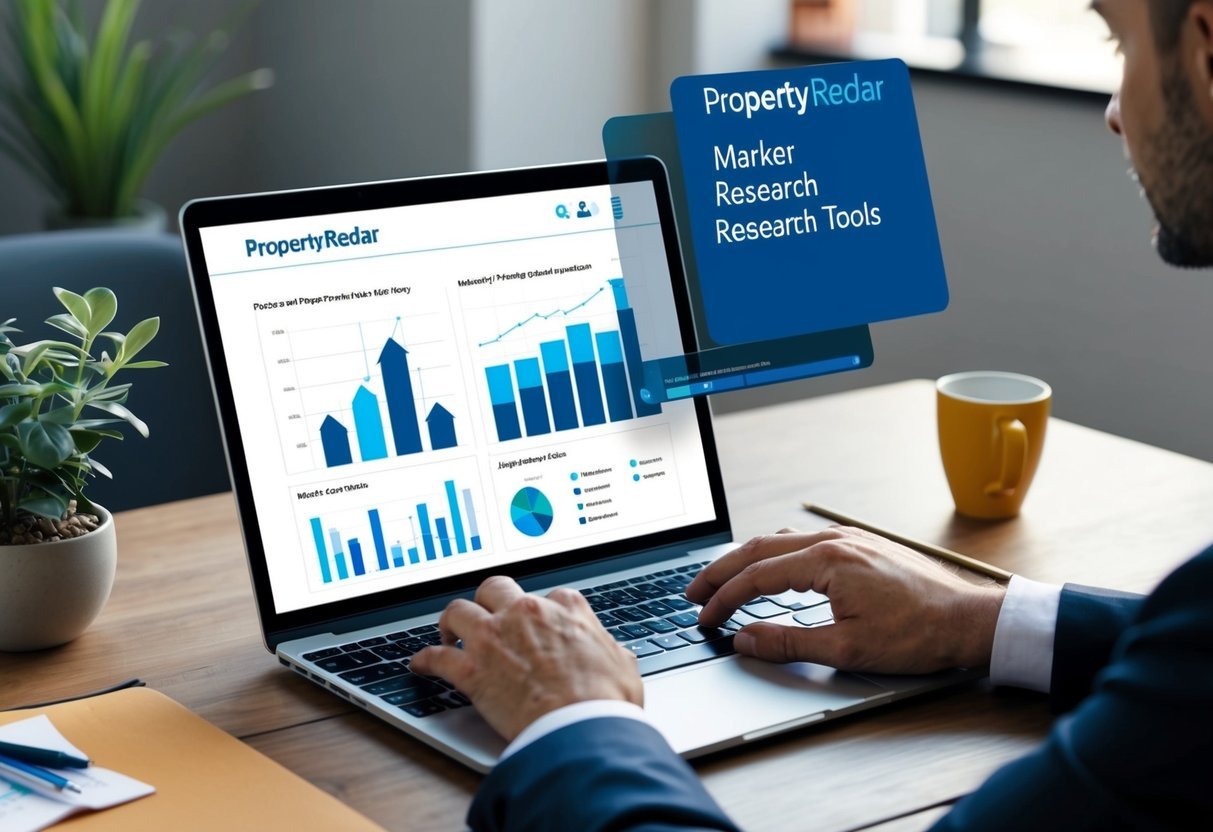Real estate investing can be a lucrative venture, but success often hinges on making informed decisions.
Conducting thorough market research is crucial for identifying promising opportunities and mitigating risks.
By leveraging the right tools, you can gain valuable insights into property values, market trends, and potential returns on investment.

Effective market research tools empower you to analyze vast amounts of data quickly and accurately, giving you a competitive edge in the real estate market. These tools can help you evaluate neighborhoods, compare properties, and forecast market conditions.
With the right resources at your disposal, you’ll be better equipped to make smart investment choices and maximize your profits in the dynamic world of real estate.
1) Reonomy
Reonomy is a powerful tool for real estate investors seeking comprehensive property intelligence.
This platform aggregates data from multiple sources, providing you with valuable insights for market analysis.
You’ll find Reonomy particularly useful for discovering off-market properties.
Its proprietary algorithms and machine learning capabilities help uncover potential investment opportunities that aren’t publicly listed.
With Reonomy, you can access up to 100 data points for each property.
This wealth of information allows you to make informed decisions about potential investments.
The platform covers the entire United States, giving you a broad scope for your real estate research.
You can easily compare properties across different markets and identify trends.
Reonomy’s user-friendly interface makes it simple to navigate through the vast amount of data.
You can quickly filter and sort properties based on your specific investment criteria.
One of Reonomy’s standout features is its ability to provide ownership information.
This can be invaluable when you’re looking to contact property owners directly for potential deals.
While Reonomy offers robust features, it’s important to note that it comes with a significant price tag.
However, many investors find the cost justified by the quality and depth of information provided.
2) CoreLogic
CoreLogic stands out as a comprehensive market research tool for real estate investors.
You’ll find a wealth of property data and analytics to inform your investment decisions.
The CoreLogic HPI Index provides up-to-date home price valuations, giving you insights into market trends dating back to 1976.
This historical perspective can help you identify patterns and make more informed predictions.
For rental market analysis, CoreLogic offers the U.S. Single-Family Rent Index.
This tool tracks rent price changes across different market segments, allowing you to spot opportunities in specific areas.
You can access CoreLogic’s data through their mobile app, which is particularly useful when you’re on the go.
It enables you to pull property reports, market insights, and create custom searches while visiting potential investment properties.
CoreLogic also provides fraud detection services, which can be crucial in protecting your investments.
With real estate fraud costing $145.2 million in 2023, this feature helps you avoid potential scams and ensures the legitimacy of your transactions.
By leveraging CoreLogic’s tools, you can gain a competitive edge in the real estate market.
The platform’s combination of current and historical data, along with its user-friendly interface, makes it an invaluable resource for both novice and experienced investors.
3) PropertyRadar

PropertyRadar is a powerful real estate investing software that can significantly enhance your market research capabilities.
It offers a comprehensive database of public records, allowing you to access detailed information about residential and commercial properties.
With PropertyRadar, you can easily research property ownership, transaction history, and market trends.
This tool provides valuable insights that can help you make informed investment decisions.
One of the standout features of PropertyRadar is its Market Heatmap.
This visual representation of real estate data allows you to quickly identify trends and patterns in specific markets.
You can analyze metrics such as home prices, rental rates, and vacancy rates at a glance.
PropertyRadar offers two subscription plans to suit different needs.
The Essential Plan is priced at $59 per month, while the Complete Plan costs $99 per month.
Both plans come with a free three-day trial, allowing you to test the platform before committing.
As a real estate investor, you’ll appreciate PropertyRadar’s integration capabilities.
It can connect with popular CRM systems and lead follow-up software, streamlining your workflow and helping you manage your leads more effectively.
4) Real Capital Analytics

Real Capital Analytics offers valuable insights for real estate investors seeking comprehensive market data.
This tool provides detailed information on commercial property transactions, helping you make informed investment decisions.
With Real Capital Analytics, you gain access to a vast database of global commercial real estate transactions.
This universal data and analytics solution covers various property types, including office, retail, industrial, and multifamily assets.
You can use this tool to track market trends, analyze pricing patterns, and identify potential investment opportunities.
Real Capital Analytics allows you to compare different markets and property sectors, giving you a competitive edge in your investment strategy.
The platform offers customizable reports and analytics, enabling you to focus on specific geographic areas or property types that align with your investment goals.
You can also monitor transaction volumes, cap rates, and other key metrics to gauge market performance.
Real Capital Analytics provides valuable insights into market participants, including buyers, sellers, and lenders.
This information helps you understand the competitive landscape and identify potential partners or acquisition targets.
Understanding Market Research in Real Estate

Market research is a crucial tool for real estate investors to make informed decisions and maximize returns.
It provides valuable insights into property trends, market conditions, and potential opportunities.
Importance of Market Research for Investors
Effective real estate market research helps you identify lucrative investment opportunities and minimize risks.
By analyzing market data, you can:
• Spot emerging neighborhoods with growth potential
• Determine optimal pricing strategies
• Identify property types in high demand
Market research also enables you to anticipate shifts in the real estate landscape.
This foresight allows you to adjust your investment strategy accordingly, staying ahead of the competition.
Understanding local economic factors, such as job growth and population trends, is essential.
These indicators can significantly impact property values and rental demand in specific areas.
Key Components of Effective Market Research
To conduct thorough market research, focus on these critical elements:
- Property values and trends
- Rental rates and occupancy levels
- Demographics and population growth
- Local economic indicators
- Zoning laws and future development plans
Utilize a mix of quantitative and qualitative data sources.
Analyze public records, real estate databases, and local market reports.
Complement this with on-the-ground research, including property visits and conversations with local real estate professionals.
Consider employing advanced tools and techniques to streamline your research process.
Geographic Information Systems (GIS) can help you visualize market trends, while predictive analytics can forecast future property values.
Evaluating Market Research Tools

Selecting the right market research tools is crucial for real estate investors.
The right tools can provide valuable insights and streamline your decision-making process.
Criteria for Selecting the Best Tools
When choosing market research tools for real estate investing, consider the following criteria:
Accuracy: Ensure the tool provides up-to-date and reliable data.
Ease of use: Look for intuitive interfaces that don’t require extensive training.
Comprehensiveness: The tool should offer a wide range of data points, including:
- Property values
- Rental rates
- Population demographics
- Economic indicators
Cost-effectiveness: Compare pricing plans to find tools that fit your budget.
Integration capabilities: Check if the tool can integrate with other software you use.
Customer support: Reliable customer service can be invaluable when you need assistance.
Advantages of Using Market Research Tools
Utilizing market research tools offers several benefits for real estate investors:
- Time-saving: Tools can quickly compile data that would take hours to gather manually.
- Informed decisions: Access to comprehensive data helps you make more confident investment choices.
- Competitive edge: Stay ahead of market trends and identify opportunities before others.
- Risk mitigation: Thorough research reduces the likelihood of poor investment decisions.
- Scalability: As your portfolio grows, these tools can help you analyze multiple markets efficiently.
By leveraging the right market research tools, you can enhance your real estate investment strategy and potentially increase your returns.
Integrating Market Research into Investment Strategy

Market research empowers real estate investors to make informed decisions and optimize their portfolios.
By leveraging data-driven insights, you can identify lucrative opportunities and mitigate risks effectively.
Aligning Research with Investment Goals
To maximize the value of your market research, align it with your specific investment objectives.
Start by clearly defining your goals, whether they involve long-term appreciation, cash flow generation, or portfolio diversification.
Once your goals are established, tailor your research to focus on relevant metrics and indicators.
For example, if you’re seeking cash flow properties, prioritize data on rental yields and occupancy rates in target areas.
PropTech innovations can streamline this process, offering tools to analyze vast amounts of data quickly.
Utilize platforms that provide comprehensive market reports, allowing you to compare different locations and property types efficiently.
Case Studies of Successful Investments
Examining real-world examples can provide valuable insights into effective market research integration.
For example, an investor used data-driven solutions to identify an emerging neighborhood before prices surged.
By analyzing demographic trends, infrastructure developments, and economic indicators, this investor recognized the area’s potential early.
Their thorough research led to a strategic purchase that yielded significant returns as the neighborhood’s popularity grew.
Another successful case involved a commercial real estate developer who leveraged online tools to assess demand for office spaces in various cities.
This research guided their decision to repurpose an old warehouse into modern co-working spaces.
This move met a growing market need and achieved high occupancy rates.
Frequently Asked Questions

Real estate investors have numerous questions about market research tools and techniques.
The following addresses key concerns around analytics, software features, and methods for finding profitable opportunities.
What are the most effective market analysis tools available to real estate investors?
Reonomy and CoreLogic stand out as highly effective market analysis tools.
These platforms offer comprehensive property data, ownership information, and market trends to inform investment decisions.
Which analytics tools are considered the best for evaluating real estate investments?
Real Capital Analytics excels at providing in-depth commercial real estate data and analytics.
Its robust platform allows you to evaluate potential investments across various property types and markets.
How can real estate investors perform a comprehensive market analysis on potential properties?
Utilize a combination of tools like PropertyRadar for property details and local market data.
Then, supplement this with on-site visits, comparable property analysis, and demographic research to gain a full picture.
Can you recommend any free tools for conducting real estate market analysis?
While not as comprehensive as paid options, free tools like Zillow Research and the U.S. Census Bureau website offer valuable market insights.
These resources provide neighborhood statistics, price trends, and demographic data at no cost.
What methods are most reliable for finding lucrative real estate deals?
Networking with local real estate professionals, attending auctions, and using off-market property databases can uncover hidden gems.
Consistently monitoring multiple listing services and setting up automated alerts for properties meeting your criteria also prove effective.
What features should investors look for in rental market analysis software?
Prioritize software that offers accurate rent estimates, vacancy rate data, and projected cash flow analysis.
Look for tools that integrate with property management platforms.
Also, find options that provide customizable reporting to streamline your investment analysis process.

